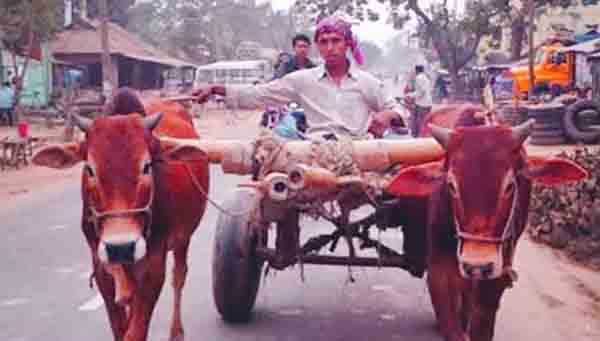Azizur Rahman, Keshabpur (Jessore) Correspondent : The traditional bullock cart is getting lost in Keshabpur. The boys / girls of the present age are being deprived of these feelings due to the loss of bullock carts from the present village Bengal.
The word bullock cart is also getting lost in the rotation of time. On the way to the village, the ox-cart, the wife is going to the father-in-law’s house. Although the word is a line of poetry, at one time it was real. Such a scene is now unrealistic. Even if we go to the villages, it has become difficult to see such bullock carts now. There was a time when this bullock cart was the only means of transportation for the people of the village. That was not too long ago. Even 25/30 years ago, the value of these bullock carts was much higher. But now the bullock cart is getting lost in the rotation of time. Maybe one or two bullock carts can be found in the countryside of Keshabpur. Almost all the cattle carts are extinct today. At one time bullock cart competitions were played in rural Bengal during the festival of harvesting new paddy. This game was an instrument of pure joy for the people of the village. Whose car will go first, this competition would be in the open field. This game is also lost today in the whirl of tomorrow. What people once imagined is now at hand, like bricks and stones, people have become mechanical, people are losing their own heritage. In its continuation, the once popular village-Bangla and Bengali tradition and the main means of communication and transportation of goods, the bullock cart is getting lost day by day in the evolution of time. Van, bus, autorickshaw, Nachimon, Karimon, Bhatvati etc. have taken the place of bullock carts due to mechanical invention and touch of technology among the farmers. People from all walks of life, including farmers, are now dependent on all means of transportation for transportation and transportation of goods. At one time in rural Bengal, various types of bullock carts were decorated in the houses of the farmers. Now the bullock carts are not as visible in the villages as before. For this reason, the boys and girls of the city are far away, at present many boys and girls of the village are not familiar with the word bullock cart. With most of the roads paved, it is no longer possible to drive a bullock cart. However, in case of bringing paddy from the field or in remote areas of the village and the road ghats are not good, it is not possible to bring goods from there without bullock carts. That is why they rely on bullock carts. However, if the rural road ghats are developed in the future, the next generation may not be able to see these traditional bullock carts of rural Bengal. There will come a time when there will be no bullock carts left. The bullock cart will only be history. In the past, people used to travel from one place to another in bullock carts for various occasions starting from weddings. But now with the change of era, the oldest bullock cart is about to get lost. People carried goods, bullock carts were the only carriers carrying paddy to the farmers at the Nabanna festival. Even new wives were brought and taken in bullock carts. On all occasions, including the first Baishakh, it is a different feeling to sit in a bullock cart and go to see a fair from one village to another with one’s family. But the boys / girls of the present age are being deprived of these feelings as the bullock cart has been lost from the present village Bengal. Following in the footsteps of tradition, this bullock cart will one day take its place on the pages of a book. No one of future generations will recognize a bullock cart. The bullock cart is a part of the tradition. We are losing a lot of history and tradition. The pace of development has not stopped in the course of time. Erakamanana tradition is losing from our lives.

